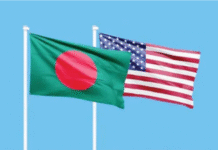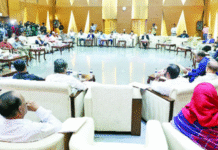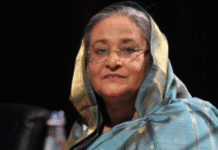
The UN Human Rights Council on Tuesday asked Myanmar authorities to allow independent investigation into possible genocide in Rakhine State.
In a resolution, the council also asked Myanmar for immediate steps to stop organised violence against ethnic minority Rohingyas that made them ‘barely human’ over five decades.
The resolution was adopted in a special session in Geneva with 33 of the 47 member-countries supporting Bangladesh’s move, while nine countries, including India, abstained from vote and three countries –– China, Burundi and Philippines –– voted against it.
UN high commissioner for human rights Zeid Ra’ad Al Hussein, setting context for passage of the resolution, said, ‘Considering the decades of statelessness as well as systematic and systemic discrimination against the Rohingyas, policies of segregation, exclusion and marginalisation, long-standing patterns of violations and abuses with little or no access to justice and redress, and considering the recent allegations of killing by random firing of bullets, use of grenades, shooting at close range, stabbings, beatings to death, and the burning of houses with families inside, sexual violence, rape and systematic destruction of villages, homes, property and livelihoods deemed by the perpetrators themselves as belonging to a different national, ethnic, racial or religious group, can anyone rule out that elements of genocide may be present?’
The pattern of gross violations of the human rights of the Rohingya suggested a widespread or systematic attack against the community, possibly amounting to crimes against humanity, and warranting the attention of the International Criminal Court, he said.
Refusal by international as well as local actors to even name ‘Rohingyas as
Rohingyas – to recognise them as a community and respect their right to self identification – is yet another humiliation, and it creates a shameful paradox,’ he said.
More than half of the Rohingyas had already been forced to leave their home in Rakhine State by organised violence and systematic attacks by Myanmar security forces and local Buddhist militia, Zeid said.
He said Myanmar security forces response to attacks allegedly by ‘insurgents’, appeared to have deliberately and massively targeted civilians.
UN special representative of secretary-general on sexual violence in conflict Pramila Patten said, ‘I heard the most heart-breaking and horrific accounts of sexual atrocities reportedly committed in cold blood out of a lethal hatred of these people solely on the basis of their ethnicity and religion.’
Crimes included ‘rape, gang rape by multiple soldiers, forced public nudity and humiliation, and sexual slavery in military captivity,’ Patten said.
Several UNHRC members stressed the need for launching independent investigations inside Myanmar for making perpetrators involved in dehumanisation process accountable.
Several countries including Russia stressed the need for implementation of the final report of the Kofi Annan Commission on citizenship and other issues.
China and Russia stressed the need for bilateral settlement involving Bangladesh and Myanmar to resolve the Rohingya crisis.
Some of them also advocated for remaining alert against the possibility of re-victimisation of Rohingya returnees in Rakhine State.
State minister for foreign affairs M Shahriar Alam urged for sustained international pressure on Myanmar until solutions come in coming months and years with full implementation of the Kofi Annan Commission’s final report.
The special session was convened following an official request by Bangladesh and Saudi Arabia, supported by 73 UN member states.
This was the 27th special session of the council.
Over 6,26,000 Rohingyas, mostly women, children and aged people, entered Bangladesh, fleeing unbridled murder, arson and rape during ‘security operations’ by Myanmar military in Rakhine, what the United Nations denounced as ethnic cleansing, between August 25 and December 2.
The ongoing Rohingya influx took the total number of undocumented Myanmar nationals and registered refugees in Bangladesh to over 10,45,000 till Sunday, according to estimates by UN agencies.
Source: New Age.









